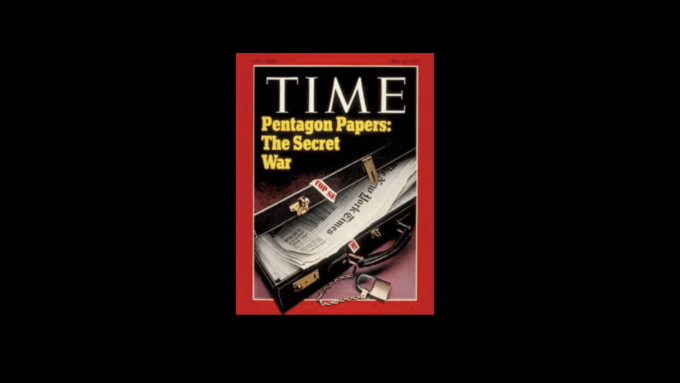
June 13 will be the fiftieth anniversary of the publication of the secret Pentagon Papers, a vast collection of internal U.S. decision-making documents on the Vietnam War.
The Papers provoked questions about how the war could have been waged through six presidencies in a row: Harry Truman, Dwight Eisenhower, John Kennedy, Lyndon Johnson, Richard Nixon, and Gerald Ford. How could such dissimilar presidents have gone wrong — over and over again? Why couldn’t they stop? Did they get bad intelligence? Did they pick unworthy advisers? Did other bureaucratic dynamics guarantee bad decisions every time? Were they afraid of losing re-election?
This speculation avoided a more straightforward conclusion: Six presidents in a row did not change the long-term goals and strategy, and could not have if they wanted to, because presidents don’t decide those things.
This is what is missing from the Papers. It is the empire in the room nobody wants to talk about.
In a globe-spanning empire, such decisions are too important to entrust to a president. Too much is at stake. The long-term foreign policy goals and strategy are set by a complex foreign policy establishment. It includes the Pentagon, weapons manufacturers, CIA, NSA and fifteen other intelligence agencies, multinational tech firms, banks and other corporations, selected members of Congress, both political parties, elite universities, think tanks, and big media.
Who are these people? They have titles like Chief Executive Officer or Executive Director but serve as replaceable functionaries. If they stray from the consensus of people with similar titles, their job will be given to someone who is more of a team player.
Presidents are functionaries, too. Their function is to either gain public consent for the policy or hide the policy. And they must make tactical adjustments to the policy as circumstances change, so long as the policy stays within set boundaries.
If a president strays, the foreign policy establishment can warn them, ignore their orders, or in extreme circumstances, remove them from office. (See “Removing a U.S. President Without an Election,” CounterPunch, June 12, 2020).
Of course, presidents do their best to appear to be in charge. History books are littered with proclaimed presidential doctrines from the Monroe Doctrine to the Truman Doctrine to the Carter Doctrine to the Bush Doctrine.
For example, on November 3, 1969, President Richard Nixon announced the Nixon Doctrine, also known as Vietnamization, saying, “. . . we shall furnish military and economic assistance when requested in accordance with our treaty commitments. But we shall look to the nation directly threatened to assume the primary responsibility of providing the manpower for its defense.” He did not mention this was nothing new. It had also been the policy of all his Vietnam War predecessors from Truman on.
Nixon started pulling U.S. troops out because he had to. Army Colonel Robert Heinl wrote in the Armed Forces Journal, “By every conceivable indicator, our army that now remains in Vietnam is in a state approaching collapse, with individual units avoiding or having refused combat, murdering their officers and noncommissioned officers, drug-ridden, and dispirited where not near mutinous.” Domestically, things were no better. With a majority of U.S. public opinion already opposed to the war, Nixon gave his Vietnamization speech just before half a million people arrived in Washington to demand peace.
In the 7,800 pages of the Pentagon Papers, you can find only one hint of the leading role of the foreign policy establishment. It refers to the Vietnam policy meetings of the Senior Informal Advisory Group (“Wise Men”) with President Johnson in 1967 and 1968. They included representatives of five powerful corporate law firms (Sullivan and Cromwell; Covington and Burling; Dillon Read; Simpson Thacher and Bartlett; and Milbank, Tweed, Hadley & McCloy), the Council on Foreign Relations, the Bilderberg Group, and the Rockefeller and Ford Foundations. Each participant had previously held high-level government posts as well.
One sign of the Wise Men’s power: The Pentagon Papers compilers had no internal documents from those meetings to use as sources. Instead, they had to rely on a Los Angeles Times article by reporter Stuart Loory.
And if the U.S. assault on Vietnam was a decision of the empire, not just mistakes by a few presidents, then it took more than a change of presidents to end it. It is not possible to understand how peace came by focusing on the Oval Office, who was sitting there, and what they said or did.
Peace came to Vietnam because of two social movements.
Foremost, of course, was the Vietnamese national independence movement, which — for thirty years — refused to yield to the United States and the most stupefying array of weaponry ever assembled.
The other movement appeared inside the United States and its demands for peace came to be supported by sizeable majorities of public opinion. As the 1970s began, the U.S. peace movement began to wield the kind of power necessary to change history. Here are two examples:
First, after President Nixon invaded Cambodia, students launched strikes at four hundred colleges and universities, paralyzing the nation’s higher education system for the remainder of the school year.
Second, U.S. soldiers themselves began to play a leading role in the peace movement, both in Vietnam and at home.
As British historian Tariq Ali recently noted, “I cannot think of an example of any other imperial war in history, and not just in the history of the American empire but in the history of the British and French empires, where you had tens of thousands of former GIs and sometimes serving GIs marching outside the Pentagon and saying they wanted the Vietnamese to win. That is a unique event in the annals of empire. That is what frightened and scared the living daylights out of them. ‘If the heart of our apparatus is becoming infected, what the hell are we going to do?’”